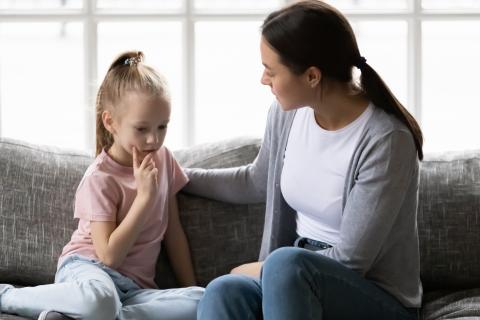Talking to Kids About Dementia
Introducing the concept of dementia to children can be a delicate and challenging task. As parents, we want to shield our children from pain and confusion, but we also want to be honest and help them understand what’s happening with their loved ones. When it comes to discussing a grandparent’s dementia diagnosis, open communication, empathy, and age-appropriate information are key. Here are some strategies to help guide this conversation:
Choose the right time and setting: Find a quiet, comfortable space where you can have an uninterrupted conversation with your children. Pick a time when everyone is calm and relaxed and there are no distractions.
Be honest and age-appropriate: Tailor your explanation to your children’s age and level of understanding. Use simple language and concepts that they can grasp. For younger children, you might explain that grandma or grandpa’s brain is not working the way it used to, which can make them forget things or act differently. Older children may benefit from a more detailed explanation about the brain and the progression of the disease.
Encourage questions and emotions: Let your children know that it’s okay to feel sad, confused, or worried. Encourage them to ask questions and express their feelings. Validate their emotions and reassure them that you are there to support and listen to them.
Provide reassurance and stability: Assure your children that they are not alone in this journey and that the family will work together to support their grandparent. Reaffirm your love for them and emphasize that the diagnosis does not change how much their grandparent cares about them.
Maintain routine and normalcy: Children thrive on routine and stability, especially during times of uncertainty. Try to maintain regular activities and traditions with your children and their grandparent as much as possible. This can provide a sense of normalcy and security amidst the changes caused by dementia.
Empower them with knowledge: Help your children understand what dementia is and how it affects their grandparent’s behavior and memory. Share age-appropriate resources such as books, videos, or online articles that explain dementia in a way that they can understand. The Alzheimer’s Association offers resources for helping kids and teens understand Alzheimer’s disease at alz.org/kids.
Model compassion and patience: Children learn by example, so model empathy, compassion, and patience in your interactions with your loved one who has dementia. Encourage your children to show kindness and understanding, even when their grandparent’s behavior may be confusing or frustrating.
Offer support and seek help when needed: Let your children know that there are resources and support available to help them cope with their feelings and understand dementia better. Consider involving a counselor or support group if your children need additional assistance processing their emotions.
Talking to your children about a grandparent’s dementia diagnosis requires sensitivity, honesty, and open communication. By approaching the conversation with empathy and understanding, you can help your children navigate this challenging time with resilience and compassion. Remember, the most important thing is to reassure your children of your love and support as a family, no matter what challenges may arise.
